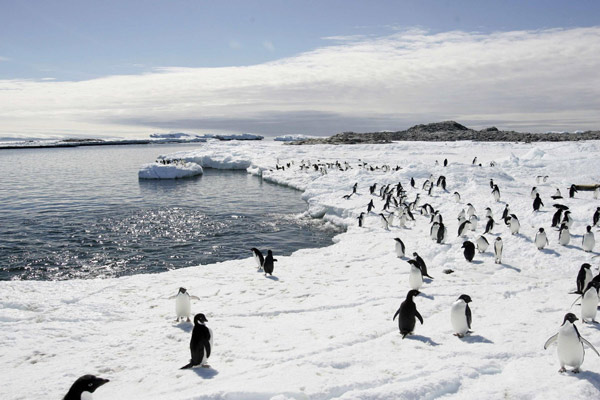Global warming might significantly raises sea level: study
Updated: 2013-07-16 08:05
(Xinhua)
|
||||||||
BERLIN - Greenhouse gases emitted today might raise sea level significantly for centuries to come, an international study published on Monday showed.
"Each degree of global warming is likely to raise sea level by more than 2 meters in the future," the Germany-based Potsdam Institute for Climate Impact Research (PIK) said in a statement.
"CO2, once emitted by burning fossil fuels, stays an awful long time in the atmosphere. Consequently, the warming it causes also persist," said Anders Levermann, lead author of the study and PIK expert.
"The problem is: once heated out of balance, they simply don't stop," he said.
According to the study published in the Proceedings of the National Academy of Sciences journal, thermal expansion of the ocean and melting mountain glaciers are the most important factors causing sea-level change today. During the 20th century, sea level rose by about 0.2 meters, and it is projected to rise by significantly less than two meters by 2100 even by strongest scenarios considered.
Within the next two millennia, however, the Greenland and Antarctic ice sheets will be the dominant contributors.
If global mean temperature rises by 4 degrees compared to pre-industry times, which in a business-as-usual scenario is projected to happen within less than a century, Antarctic ice sheets will contribute about 50 percent of sea-level rise. Currently, less than 10 percent of the rise comes from ice-loss in Antarctica. Greenland will add another 25 percent to the total sea-level rise.
Levermann warned that continuous sea-level rise could not be avoided "unless global temperatures go down again", suggesting to take measures.
"It is inevitable and therefore highly relevant for almost everything we build along our coastlines, for many generations to come," he said.
Governments wish to limit global warming under 2 degrees compared to pre-industry times. In the latest round of United Nation climate change negotiations, a concrete process towards a new global agreement on battling against the global challenge has been made. The agreement, which is supposed to include elements of emission cutting, adaptation, financial and technology transferring, is scheduled to be made in 2015 and come in to force in 2020.

 Putin wants Snowden to go, but asylum not ruled out
Putin wants Snowden to go, but asylum not ruled out
 Apple to probe death of Chinese using charging iPhone
Apple to probe death of Chinese using charging iPhone
 Investment falters as industrial activity flags
Investment falters as industrial activity flags
 Rape victim's mother wins appeal
Rape victim's mother wins appeal
 Reproduction of 'Sunflowers' displayed in HK
Reproduction of 'Sunflowers' displayed in HK
 Land Rover enthusiasts tour the world
Land Rover enthusiasts tour the world
 US star sprinter fails drug test
US star sprinter fails drug test
 Protests erupt after verdict
Protests erupt after verdict
Most Viewed
Editor's Picks

|

|

|

|

|

|
Today's Top News
Global warming might significantly raises sea level: study
Putin wants Snowden to go, asylum not ruled out
Trailblazer reaches out to inmates on death row
Air crash payouts could differ
Cabinet promises more funds for smaller firms
Capital prison tests therapy on inmates
Regulation to improve public organ donations
Japan seeks to 'nationalize' islands
US Weekly

|

|







